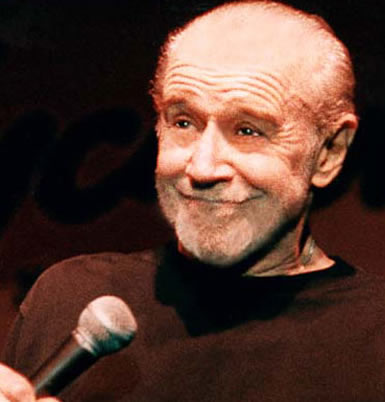Beautiful Fresh Air Tribute
Iconoclastic Comic George Carlin Dies at 71
Comedian George Carlin, who died Sunday of heart failure at 71, was known for an act featuring "seven dirty words" that became the focus of a Supreme Court case. But he wasn't always a controversial figure.
His early act was marked by clever wordplay and spoofs of popular culture. He showed up on Ed Sullivan or The Tonight Show in his suit and tie throughout the 1960s. America loved the clean-cut New Yorker.
"I went through about eight or nine years of what essentially were the extended 1950s, sort of a button-down period. But that was when the country was changing," he said.
And Carlin changed with it. Carlin told NPR in 2004 that he felt alienated from his fan base of fortysomethings. Their kids were defining the era. He changed his look, grew out his hair and the beard that would become his trademark, and he steered his sharp, observational humor toward subjects that other comics of his generation and stature didn't dare touch: Vietnam, the counterculture, drugs and, of course, obscenity.
Seven Words
"There are 400,000 words in the English language, and there are seven of them you can't say on television," Carlin would say in a routine in the '70s. "What a ratio that is: 399,993 to seven. They must really be bad."
And he famously proceeded to say them.
Police in Milwaukee arrested him for disturbing the peace after a performance in 1972. He was arrested several more times after that, but he refused to drop the bit from his act.
"It had a wonderfully rhythmic — the reading of those seven words, the way they were placed together — had a magnificent kind of a jazz feeling," Carlin said about the routine on WHYY's Fresh Air. "And so I knew I had done something that was making an important point about the hypocrisy of all of this."
In 1978, the "seven dirty words" riff was the focal point of a Supreme Court ruling: The New York radio station WBAI had played a recording of it — without bleeps — and caught the ire of the Federal Communications Commission. A 5-4 decision reaffirmed the government's right to regulate speech that the FCC deems offensive.
Crossing the Line
Meanwhile, Carlin's iconoclasm had become part of the mainstream. He won Grammy Awards; he was the host for the first episode of Saturday Night Live. And his envelope-pushing and pointed politics helped pave the way for comedians from Richard Pryor to Cheech and Chong to Eddie Murphy to Chris Rock to Bill Maher.
"I like to find out where the line might be drawn and then deliberately cross it," he said during an NPR interview in 2000. "There are an awful lot of taboos. ... I just enjoy squashing them and stepping on them and peeling them apart and trying to expose them to people. For some reason, it makes me happy."
In the decades since Carlin first cast his lot with the counterculture, he has come to be nearly universally regarded as one of America's greatest comedians. Just a few days ago, The Kennedy Center announced that Carlin would be awarded this year's Mark Twain Prize, the nation's highest honor for humorists.
Wednesday, June 25, 2008
Beautiful Fresh Air Tribute to George Carlin
Subscribe to:
Post Comments (Atom)



No comments:
Post a Comment